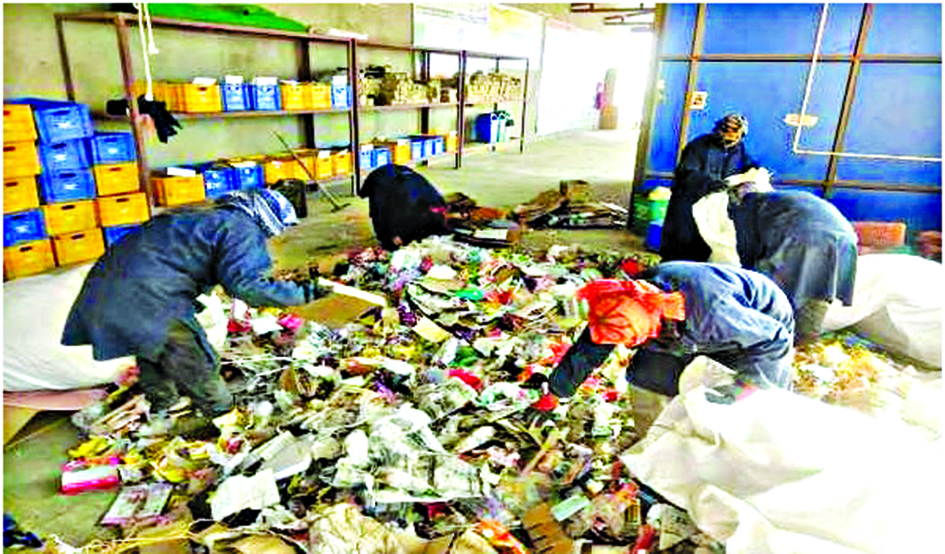news details |
|
|
| Project Tsangda changing face of Ladakh through efficient waste management | | |  Early Times Report Early Times Report
Leh, Aug 20: Waste management remains a serious concern globally and Leh, the capital of the recently created Union Territory (UT) of Ladakh, is no exception.
Being a popular tourist destination for domestic and international tourists as well, this city has faced a huge problem of garbage of non-biodegradable waste as the visitors discard used water bottles, soft and other drinks which come packed in single use plastic and other materials.
Responding to this grave civic concern in Ladakh in general and Leh in particular, the Union Territory administration paced up the ‘Project Tsangda’, started in December, 2013 towards sustainable waste management in rural and semi-rural areas of Ladakh under the Rural Development Department of the region. ‘Tsangda’ means cleanliness in the local Bothi (Ladakhi) language.
Though, the first garbage collection centre came up in 2017 at the urban sprawling of the Leh Choglamsar, but soon after the creation of the new administrative system in August 2019, the Ladakh UT administration provided financial assistance under the ‘Special Development Fund’ and setting up of each center which cost Rs 30 lakh, and so far this project is being run at Choglamsar, Disket, Nubra,Khaltse, Nimoo, Pangoan and Chouchot.
The collected garbage consists of wet and solid wastes. While the wet garbage is used for compost manure, the solid waste are segregated at the collection centre and processed.
“The project works on a very sustainable mechanism which begins with door to door collection of waste and brought to the centers where the waste was segregated in to secondary and tertiary.
While biodegradable litters have been composted for further utilization in agriculture farms, the non-biodegradable items have been used for used for construction works such as foundation of buildings, walls and roads,’’ Sonam Chojor, Assistant
Development Commissioner of Rural Development Department said.
“While the bottles and glass materials were crushed and used in the foundation of the buildings to prevent foundation of the buildings from the menace of invasion by rats, the thermocols are used as insulators by putting it between the walls of the houses to keep heat within the buildings during almost six months of harsh winter season”, he said.
The plastic bottles and other packaged materials are used in the construction of roads and walls.
The plastic bottles are shredded into small pieces and mixed up with bitumen and a layer of this mixture is used in construction of roads whereas the bottles are filled with hard soil or sand and these are used as bricks while constructing boundary walls of a house or a building, he added.
The Project Manager of Tsangda Ms Yangchan Dolma informed that a 10 kilometer long road was built up in Stoke village by using non-degradable plastic materials.
Similar efforts have also been made at famous tourist destination at Pangong Tso lake and the local population is contributing to a great extent to keep the area clean.
Under this project, a total of 3078 units, including 2018 households and 1060 commercial establishments, are being covered and are benefitting 25,000 individuals.
The main benefits include environment protection and prevention of water and land pollution.
If left uncollected, 514 tonnes of waste would have been lying in landfills and polluting the water bodies and pasture lands and adulterating and damaging the water bodies or pasture lands and damaging the ecosystem, the officials attached to this project said.
Soon after the announcement made by the Prime Minister Narendra Modi that Ladakh would be second carbon free state, he also said last week that efforts are on to make the Union Territory of Ladakh a carbon-neutral region.
Carbon neutrality means having a balance between emitting carbon and absorbing it from the atmosphere in carbon sinks. It is significant as greenhouse gas or carbon emissions adversely affect the climate.
``Just like Sikkim has made its mark as an organic state, efforts are being made to make Ladakh a carbon-neutral region," said Mr Modi while addressing the country from the ramparts of the Red Fort on the occasion of the 74th Independence Day.
In 2003, Sikkim became the first state to announce adoption of organic farming, which also helped in reducing its carbon footprint.
|
|
|
|
|
|
|
|
|
|
|
|
|
| |
| |
|
|
|
|
 |
|
|
|
|
STOCK UPDATE |
|
|
 |
| BSE
Sensex |
 |
| NSE
Nifty |
|
|
| |
CRICKET UPDATE |
|
|
|
|
|
| |
| |
|
|
| |
|
|
|
|
| |
|
|
|
|
|
|
|
|
|
|
|
|
|
